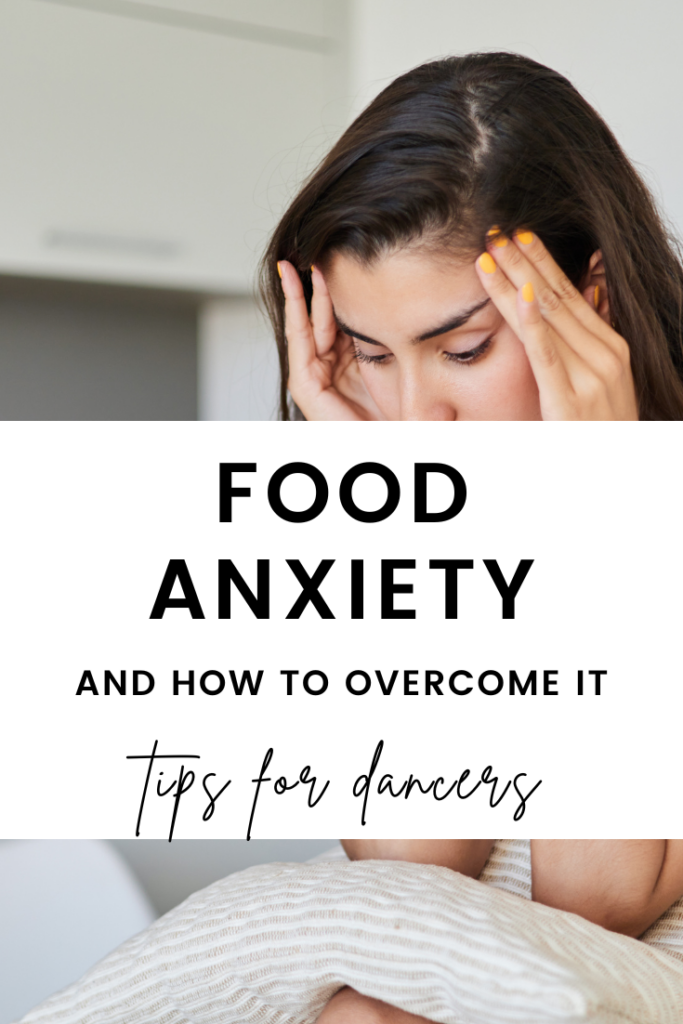Food anxiety can feel like a major obstacle that limits your ability to heal your relationship with food. Food anxiety can show up in a number of ways— for many, it involves overwhelming self-doubt as you question whether or not your choice is the “right” choice. For some, it’s looming stress prior to your meal— perhaps you’re worried over what foods will be available to you and if those foods fit into a specific set of parameters (like food rules). This article will discuss the most common reasons for why dancers feel anxious about food, and the steps to overcome it.
Why am I feeling anxious about food?
Dancers might experience food anxiety for a number of reasons. Many (but not all) relate to past experiences with food deprivation. Let’s review some of the most common reasons why dancers might feel stressed and/or anxious about food:
You’ve experienced food insecurity
I’ve previously discussed the frustrations that come alongside oversimplified versions of intuitive eating— mainly in regard to the privileges of supposedly “eating what you want when you want” (spoiler: this is NOT what intuitive eating actually is and you can learn more here). For anyone who has experienced food insecurity, it’s understandable to feel anxious about food. Not knowing if and when food will be available to you can easily spark a sense of anxiety. Remember that food, and the calories provided, enable our bodies to function both at a physical and metabolic level. A subconscious fear of calorie deficiency, especially when this fear is etched into your body’s history, is an understandable reason for why one might feel anxious about food.
You have a history of dieting or disordered eating
Very similar to food insecurity is the impact of dieting (and arguably, disordered eating). Self-imposed food restrictions strip the trust between you and your body. While you might have physical access to food, your body is not experiencing consistent and reliable nourishment— the physiological implications and hormonal shifts that result exacerbate mealtime challenges, and ultimately, anxiety. These might include:
- Relentless and ruminating thoughts about food.
- Overall indecisiveness or difficulty with making mealtime decisions.
- Challenges with understanding and honoring hunger and fullness cues.
You’ve experienced body shaming or weight stigma
There’s no doubt that for dancers, body shaming and weight stigma can trigger stress and worsen their relationships with food. This is especially true for any dancer who has experienced type-casting and/or audition rejection based on body weight, shape, or size— an undeniable reality of an industry largely inundated with antiquated ideals about how a dancer “should” look and how a dancer “should” eat.
Strategies to overcome food anxiety
#1: Start with flexible meal planning
If your food anxiety stems from a history of food insecurity, disordered eating, or both, then rebuilding trust between you and your body is key. This might take a proactive effort— implementing strategies to ensure that your body is adequately nourished throughout the day. In my work with dancers, I’m often suggesting that snack prep be prioritized— this means convenient options are available if and when your body needs a refuel. Meal planning is another helpful tool, but for those with a tendency towards perfectionism, it’s important to implement meal planning techniques that are practical and sustainable (more on this here).
A similar proactive approach will be beneficial for dancers who have experienced (or continue to experience) food-related digestive discomfort. This might be from medically-diagnosed allergies or intolerances, digestive discomfort while dancing after a larger meal, or perhaps from food aversions (e.g., those experienced during pregnancy). Flexible meal planning will help to support reliable nourishment even during these instances and ultimately, alleviate the potential for food anxiety.
#2: Consider eating as an act of self-care
Once you’ve identified the potential source(s) of your food anxiety, it’s important to remove any self-criticism or judgment. As depicted over social media, we often idolize a “good” or “normal” relationship with food as being one that is carefree. But this is (most often) not the case nor the expectation. A supportive relationship with food often involves an ongoing and consistent effort to navigate food anxiety. This might look like:
- Rebuilding trust in the fact that consistent and reliable nourishment is available.
- Healing from a past of body shaming and/or weight stigma.
- Seeking support to build meals and snacks that are tolerable and do not exacerbate stomach discomfort.
The bottom line: your feelings of stress and anxiety are valid. If you are (financially) able to pursue efforts like packing extra snacks and serving seconds on your plate, then consider them acts of self-care in your pursuit to overcome food anxiety. Rather than feeling shameful, utilize these efforts as evidence— you are working towards reshaping your relationship with food. You are shifting mealtimes from being experiences flooded by an all-or-nothing mentality to being opportunities to honor your body’s need for nourishment.
#3: Seek support from a registered dietitian nutritionist
Working with a dietitian, especially one who is well-versed in the areas of disordered eating and intuitive eating, is highly encouraged. The Healthy Dancer® utilizes exploration and self-discovery— together, we identify why these feelings of anxiety are coming up around food. We explore reasons such as those outlined above, in addition to identifying whether or not the dieting mentality is present.
Very often, notions set forth by diet and wellness culture (particularly those that demonize foods as being “bad” and “unhealthy”) drive restrictions and exacerbate fears of “over”-doing it at mealtimes. Therefore, it’s important to identify the degree to which you might be restricting foods and challenging those beliefs— food exposures, eating regularly throughout the day, packing extra snacks, and swapping portion control with abundance are examples.



